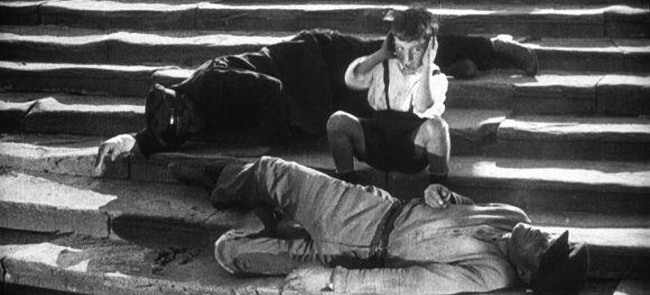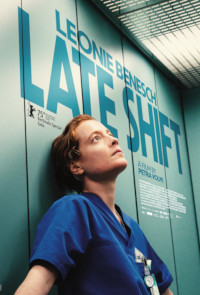| SHADOWS ON THE WALL | REVIEWS | NEWS | FESTIVAL | AWARDS | Q&A | ABOUT | TALKBACK | |||||||||||||||||||||||||||||
 Shadows off the beaten path Shadows off the beaten pathIndies, foreign, docs and shorts...
On this page:
BATTLESHIP POTEMKIN |
DYING |
LATE SHIFT
| |||||||||||||||||||||||||||||
| See also: SHADOWS FILM FESTIVAL | Last update 27.Jul.25 | |||||||||||||||||||||||||||||
|
Battleship Potemkin Review by Rich Cline |  MUST
MUST  SEE SEE

Is it streaming?
|  For its 100th anniversary, this milestone silent film has a new score by the Pet Shop Boys. Cleverly anachronistic, it reinforces the film's astonishing timelessness. Eisenstein's bold filmmaking still feels fresh, especially the innovative cinematography and editing. His work has inspired filmmakers for a century, and his techniques can be seen in the DNA of today's movies. Aside from all of that, this is simply a ripping, thrilling movie. During the first Russian Revolution in 1905, the Potemkin's crew revolts over the rotten meat their privileged officers expect them to eat. Led by Vakulinchuk (Antonov), the sailors overthrow Commander Golikov (Karskiy) and Chief Officer Giliarovsky (Aleksandrov), who had threatened to hang everyone who complained about the rancid borscht served to them. The triumphant crew then heads to Odessa, where locals get caught up in their cause. But the tsar's soldiers reply violently to crush the public display of support. Then the tsar's fleet sails out to take on the Potemkin in the Black Sea. Yes, this is Soviet propaganda, casting poor sailors and townsfolk as plucky heroes who take on the elite ruling class. But the film is assembled skilfully to include complex ideas and wonderfully grounded details. The opening scene in the crew quarters ingeniously sets the scene, as burly sailors try to sleep in hammocks with their crewmen's bare feet in their faces. Each sequence unfolds with this kind of visceral filmmaking, as Eisenstein frames and crosscuts scenes in ways that still look inventive today. His approach brings out humour, rage and underlying emotion in ways that continually take us aback, creating uncannily vivid characters in seconds of screen time. Urgency is cranked up in each of the story's chapters, creating a masterclass in suspense for today's horror filmmakers (Hitchcock clearly drew inspiration here). And the infamous climactic sequence on the Odessa Steps has lost none of its urgent power, despite so many directors borrowing Eisentein's methods over the past 100 years. Most of us have seen this on blurry videotape over the years, but watching such a pristine restoration projected is an essential cinematic experience. And this new score, which includes electronic instruments and vocals, bracingly connects the film's past with the future of the movies themselves. It also frames the historical account in a larger inspirational narrative about underdogs standing up for what's right, willing to fight to the death for justice and fairness.
|
| Late Shift Heldin Review by Rich Cline | 
|  dir-scr Petra Volpe prd Lukas Hobi, Reto Scharli with Leonie Benesch, Sonja Riesen, Alireza Bayram, Selma Jamal Aldin, Urs Bihler, Dominique Lendi, Jurg Pluss, Margherita Schoch, Urbain Guiguemde, Elisabeth Roll, Ridvan Murati, Albana Agaj release Swi 27.Feb.25, UK 1.Aug.25 25/Switzerland 1h32 BERLIN FILM FEST  Is it streaming?
|  From Switzerland, this strikingly involving drama traces a single shift in the life of an overworked nurse, highlighting the job while pointedly commenting on the global shortage of hospital nurses. And in Leonie Benesch's wonderfully transparent performance, details emerge that are strongly resonant for any audience. Writer-director Petra Volpe uses expert camerawork, smooth editing and a propulsive pace to hold the interest through both loud and quiet moments. Arriving for her afternoon shift, Floria (Benesch) discovers that her wing is short-staffed and at-capacity, and her only colleagues are Bea (Riesen) and nursing student Amelie (Aldin). Making her rounds, Floria is continually interrupted by patients, families and hospital staff, each of whom has an emergency. Still, she calms Mrs Kuhn (Schoch) with a song, takes distracted Mr Osmani (Murati) to the OR and encourages Mr Leu (Bihler) to wait patiently for test results. But Floria can't help but snap when private patient Mr Severin (Pluss) shouts at her about the hospital's less-than five-star service. There are many more patients in Floria's rounds, and the film is so cleverly contained within her perspective that we keep track of them along with her. Although she remembers details we forget. The camera sticks closely with her as she darts into rooms, takes side trips and performs tasks, all while under a barrage of seemingly urgent requests. This is somewhat overwhelming to watch, so it's easy for us to understand why Floria cracks under the pressure. But she never breaks. Constantly moving, Benesch delivers an unnervingly nuanced performance as this patient woman who carefully goes about her work despite obstacles thrown in her path. She vividly conveys her concern for her patients, and in one quietly moving moment we see her stop to think about her own life as well. So we both laugh and cry with her along the way. And everyone else on screen is so naturalistic that the film often feels like a documentary. Skilfully shifting between frantically busy sequences and moments of calm, even tranquil care, the film is unusually textured to drop us right in the middle of this high-pressure environment. Yes, this is an ode to the whole nursing profession, setting out to honour these people who give everything they have to help people who are at their most vulnerable. Without lionising them, it offers moments of triumph and success alongside the pain and failure. And it reminds us that society owes them pretty much everything.
|
| Dying Sterben Review by Rich Cline | 
|  dir-scr Matthias Glasner prd Matthias Glasner, Ulf Israel, Jan Kruger with Lars Eidinger, Corinna Harfouch, Lilith Stangenberg, Ronald Zehrfeld, Robert Gwisdek, Hans-Uwe Bauer, Anna Bederke, Saskia Rosendahl, Nico Holonics, Catherine Stoyan, Saerom Park, Clara Aileen Bowen release Ger 25.Apr.24, UK 25.Jul.25 24/Germany 3h00 BERLIN FILM FEST Is it streaming?
|  It's understandable that we might be put off by a three-hour German drama called Dying, but this is definitely worth a look for anyone who is tired of simplistic cinema. Witty and provocative, the film is a deep dive into the ways people connect, particularly the prickly nature of love between family members. And writer-director Matthias Glasner keeps things moving at a mesmerising pace that keeps us gripped. In small town Germany, Lissy (Harfouch) grapples with her own illnesses while husband Gerd (Bauer) drifts further into dementia. And her children are too preoccupied to help. Orchestra conductor Tom (Eidinger) is preparing for the Berlin premiere of Dying, composed by the suicidal Bernard (Gwisdek). Tom is also the acting father to the infant born to his ex Liv (Bederke) and her ex Moritz (Holonics). And Tom's sister Ellen (Stangenberg) is an alcoholic unsure where she will wake up next. Then she falls for her married boss Bastian (Zehrfeld), who wants to sober her up. This mother, son and daughter have never been able to express their lack of feelings for each other. Glasner's approach is so straightforward that it feels neither bleak nor miserable: these matter-of-fact people know full well that they have failed their family members. So conversations between them are simply astonishing, especially a post-funeral chat between Lissy and Tom. And the complex tensions between Tom and Bernard also lead to some goosebump-inducing musical sequences. Family resemblance is clear in the naturalistic, committed performances, from subtle attitudes to the delivery of snappy dialog. Harfouch and Eidinger have meatier roles, continually revealing internalised feelings in their various meetings. Stangenberg's Ellen is a bit less nuanced, but earns sympathy as Ellen pursues romance with Zehrfeld's likeable teddy bear. Even with various messy connections in their lives, Lissy, Tom and Ellen are essentially alone. And only one of them offers a true expression of love in the film's most emotionally disturbing sequence. The story unfolds through chapters that switch perspective between the characters, which helps us identify with their situations. So even if we don't necessarily like them, we can root for them as they try to do their best with each decision. The climactic section's title refers to the thin line between artistic purity and giving the audience what they want, that sweet spot where reality exists. This film often manages this feat as it tackles some very big ideas. So it leaves us with a lot to think about.
| 
See also: SHADOWS FILM FESTIVAL © 2025 by Rich Cline, Shadows
on the Wall
HOME | REVIEWS | NEWS | FESTIVAL | AWARDS
| Q&A | ABOUT | TALKBACK | | ||||||||||||||||||



